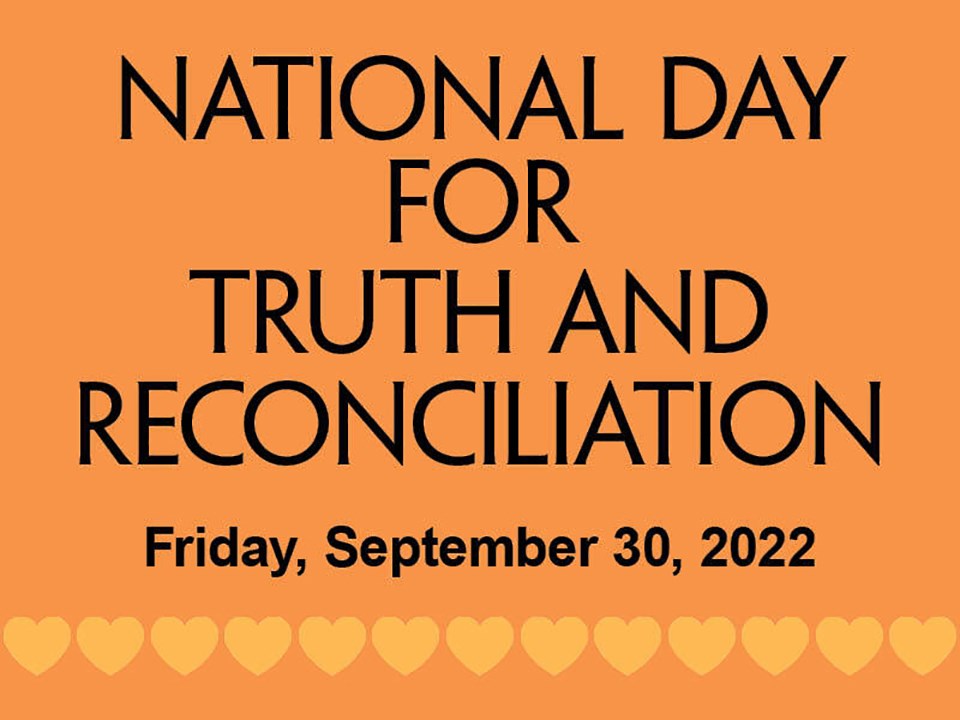This letter speaks to difficult topics about Indian Residential Schools and the Sixties Scoop. For Indigenous People, we recognize that these conversations can trigger traumatic memories and feelings. Please see the list of available supports below, and please, only participate in these conversations if your spirit is able to.
September is often viewed as a time of new beginnings, following a summer full of positivity and refreshment. But for many Indigenous people, September can be associated with a very dark time.
For over a century, September was a time of forced separation of our children and families, with children as young as four years old being taken to residential schools far away from home, including places like Sechelt, Kamloops, Mission and beyond. Some of these children never returned home or were too sick to survive after they did return home.
On September 30, Canada recognizes the second anniversary of the National Day for Truth and Reconciliation, also known as Orange Shirt Day, which was inspired by Northern Secwepemc Residential School survivor Phyllis (Jack) Webstad. She invited all Canadians to wear orange shirts to commemorate the Indigenous children who were taken from their homes and placed in residential schools.
Our Tla’amin friends and family who attended these institutions have shared with us for many decades that our lost children were buried in unmarked graves near these schools, but it was not until May 27, 2021, that this horrible multigenerational tragedy really made an impact on mainstream media in Canada. Since the first confirmation of 215 unmarked graves at a former residential school site in Tk’emlups te Secwépemc First Nation, there have been an estimated 10,028 unmarked graves identified at residential schools across Canada.
This is just the beginning - only a fraction of these institutions have been searched. With a total of 699 residential schools operating in Canada, the number of unmarked graves is expected to increase significantly.
Operating in the shadows of the Indian Residential School system was something coined as the Sixties Scoop, or Millennium Scoop. Through genocidal policies of Indian child apprehension, an immeasurable number of our children were stolen through various measures, and forcefully adopted, fostered, and sold out of their families, including overseas.
The Canadian Government ran campaigns called AIM: Adopt Indian and Metis. Through this type of program, settlers near and far could pick an Indian child from a newspaper ad to adopt into their home. Due to these discriminatory policies and perverse tactics of child apprehension, many Indigenous families suffer ongoing irreparable damage that continues to reverberate through our community.
On September 30, we invite you to take time to reflect, educate, and listen, and to practice šɛʔgat (sheh-gaht: to lift someone from their sorrow or support them). Here are some activities happening locally:
Friday, September 30: Memorial March starts at 3:30 pm in Tis’kwat at the old hospital site and goes to Ah Joo Miexw (Willingdon Beach), where a closing ceremony will be held in recognition of National Day of Truth and Reconciliation and the 94 calls to action. Participants are asked to wear orange, to honour the children who survived residential schools and remember those who did not, and arrive at 3:15 to prepare. Tla’amin elders can follow in a car.
Friday September 30: Movie screening of Bones of Crows, a film about residential schools, 7 pm at the Patricia Theatre.
On behalf of Tla’amin Nation, we give thanks. chechehatanapešt (we honour you all).
Learn more by visiting the following websites:
Orange Shirt Day, orangeshirtday.org; National Center for Truth and Reconciliation, nctr.ca; Interactive map of residential school locations, nctr.ca/records/view-your-records/archival-map; List of schools, indiandayschools.com/en/wp-content/uploads/schedule-k.pdf; Indian Residential School History and Dialogue Centre, irshdc.ubc.ca.
Here is a list of resources for Indigenous kin:
Local: Victim Services, 604.485.2620; Grace House, 604.485.9773 (24/7); Stopping The Violence, 604.485.6965; Poverty Law, 604.485.0950.
Other Indigenous-specific resources can be accessed by calling: Indian Residential School Survivors Society (IRSSS), 1.800.721.0066; IRS National Crisis Line, 1.866.925.4419; Suicide Crisis Line, 1.800.784.2432; Tsow-Tun Le Lum Crisis Line, 1.888.403.3123; KUU-Us Crisis Line, 1.800.588.8717; Child and Youth, 250.723.2040; Adult and Elder, 250.723.4050; First Nations & Inuit Hope for Wellness, 1.588.242.3310 (or online at hopeforwellness.ca); FNHA Mental Health Benefit, fnha.ca/benefits/mental-health.





